Distinguished faculty earn title named for medical school savior
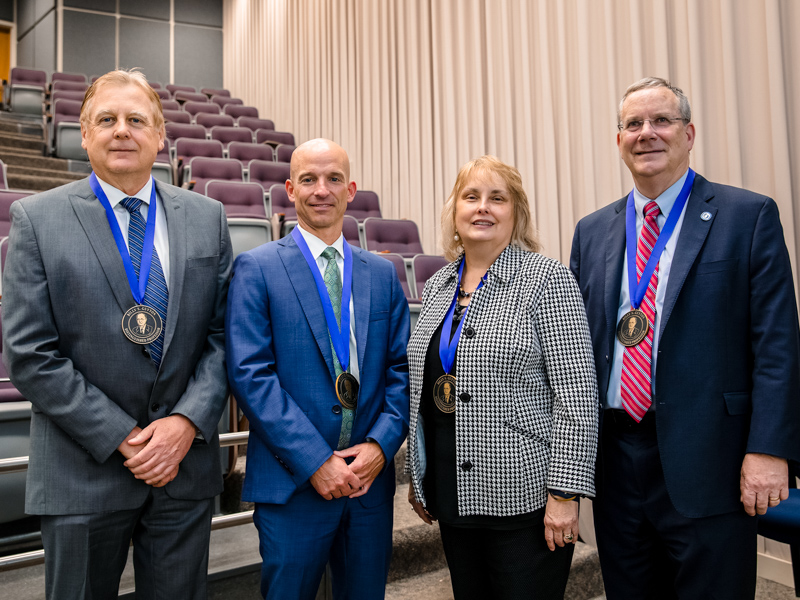
Dr. Billy S. Guyton did as much or more than anyone to safeguard the survival of the School of Medicine.
He did so when it was a two-year program in Oxford, then helped protect and build its future as the successful, four-year medical school it is today in Jackson.
Guyton, who became dean of the medical school when the economic fallout of the Great Depression threatened to bury it, prevailed; now, his legacy is celebrated at the University of Mississippi Medical Center by the awarding of a medallion that bears his name.
Last week, five members of the UMMC faculty each received that medallion as Billy S. Guyton Distinguished Professors, a title that celebrates their scholarship and serves as an inducement for them to continue their academic work for the institution.
“A great university honors those individuals who are responsible for its greatness,” said Dr. Ralph Didlake, professor of surgery and associate vice chancellor for academic affairs at UMMC, during the June 14 ceremony.
“The University of Mississippi is indeed honored to pay tribute to the contributions of Dr. Billy S. Guyton to medical education in Mississippi by awarding these distinguished professorships in his name,” Didlake said.
Billy Guyton, whose son, Dr. Arthur Guyton, developed a world-class Department of Physiology and Biophysics as the first chair of the department at UMMC, was medical school dean from 1936 to 1943. At the time of his appointment, faculty salaries had fallen below accreditation standards; the closing of the school loomed.
Supported by Chancellor Alfred Butts, Guyton described to College Board members what it would take to preserve accreditation, and the trustees persuaded the state lawmakers to come up with enough funding to save the school.
Decades later, in 1999, the Barnard Distinguished Professorships, established 11 years earlier to honor one of the University’s early chancellors, were renamed the Billy S. Guyton Professorships “to reflect the major role [Guyton] played in the development of the School of Medicine – and the subsequent establishment of the health sciences campus,” Didlake said.
The professorships are awarded every five years [the pandemic intervened in 2020]. Each comes with a $10,000 annual stipend for five years, said Dr. Rob Rockhold, professor of pharmacology and of health sciences and deputy chief academic officer, who introduced the honorees:
Dr. Barbara Alexander, professor of physiology and biophysics
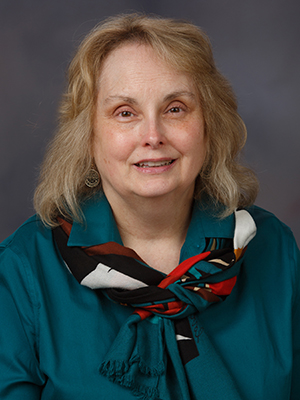
A driving force behind the Medical Center’s reputation in women’s health research, Alexander has made major contributions to the understanding of the link between birth weight and blood pressure.
She developed an animal model now used by researchers around the world to study pre-eclampsia, a pregnancy complication indicated by high blood pressure and signs of damage to organs, such as the liver and kidneys.
Alexander made the Medical Center her academic home after earning an undergraduate degree in zoology from Mississippi State University in her hometown of Starkville.
She worked as a research assistant before receiving her PhD in the Department of Biochemistry, followed by postdoctoral training and a faculty appointment in the Department of Physiology and Biophysics.
Alexander is also director of basic research for the Mississippi Center for Excellence in Perinatal Research, and director of the UMMC Analytical and Assay Research Core.
Her research, which has been funded by the National Institutes of Health and/or the American Heart Association for over 20 years, has been recognized throughout her career. Her accolades include the Arthur Guyton New Investigator Award from the Consortium for Southeastern Hypertension Control, the Merck Young Investigator Award of the American Heart Association, and the prestigious Harriet Dustan Award for Excellence in Hypertension Research from the AHA.
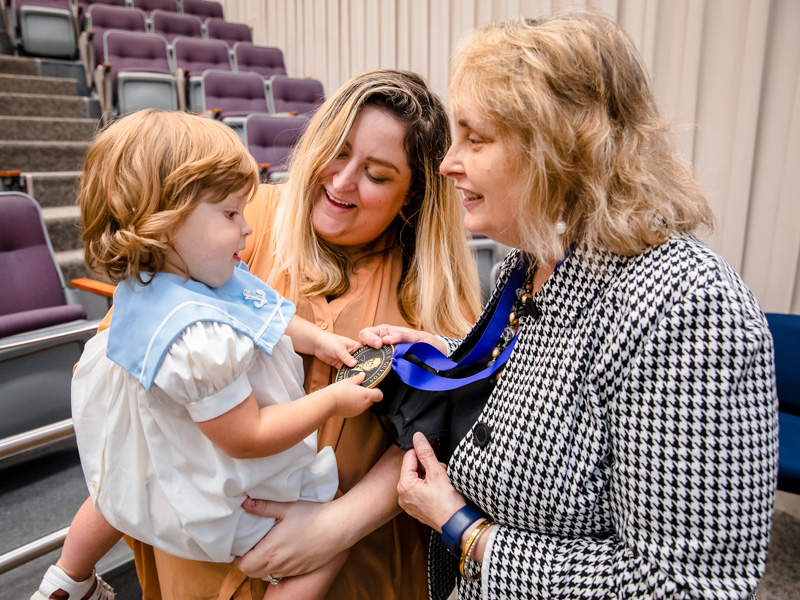
In 2015, Alexander received UMMC’s platinum medallion, the Medical Center’s highest honor recognizing extramural research funding. She is the 2019 Distinguished Alum of the School for Graduate Studies in the Health Sciences, a recipient of the Innovation Award from the UMMC Group on Women in Medicine and Science, and an elected faculty member of the UMMC Alpha Omega Alpha Chapter.
She is a member of the Awards Committee for the AHA and is a past editor for the Council on High Blood Pressure Research Connections Newsletter.
“I am deeply honored to be recognized as a Billy S. Guyton Distinguished Professor,” Alexander said. “I know this would not have been possible without the many individuals who served, and for many, who continue to serve as a mentor to me.
“Also, I cannot forget the many contributions by my trainees to my research program throughout the years. I have been very fortunate to work with so many incredible and talented individuals.
“Science is my passion, but mentoring is one of my greatest joys as an academic scientist.”
Dr. Robert Brodell, professor and chair of dermatology
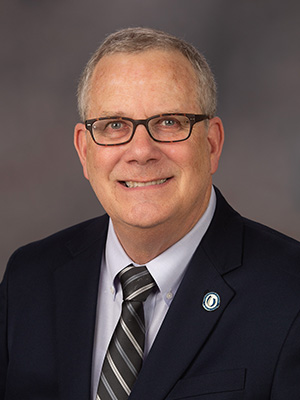
When Dr. Robert Brodell arrived at the Medical Center in 2012, the dermatology program was not at department level. About a year later, it was.
Now professor and chair of the Department of Dermatology and professor of pathology, Brodell joined UMMC when dermatology was a division under the Department of Otolaryngology, chaired by Dr. Scott Stringer, who aided Brodell in developing the division into a department.
For 20 months, Brodell chaired dermatology and, on an interim basis, the Department of Pathology at the same time.
From a young age, Brodell grew up in the Warren, Ohio. He attended the University of Rochester School of Medicine and Dentistry in Rochester, New York, and then completed two years of internal medicine at Strong Memorial Hospital before becoming a dermatology resident and dermatopathology fellow at Barnes Hospital/Washington University in St. Louis.
Before joining UMMC, he held various faculty and leadership positions at Washington University, Case Western Reserve University School of Medicine, Northeastern Ohio Universities College of Medicine, and his medical school alma mater.
He and his wife, Dr. Linda P. Brodell, an ophthalmologist, were in private practice in Ohio for 27 years.
Brodell has served as an officer or board member for the American Dermatological Association, American Board of Dermatology and American Academy of Dermatology.
He has edited or co-edited three textbooks, including Dermatology in Rural Settings: Organizational, Clinical, and Socioeconomic Perspectives.
In 2019, for starting a dermatology clinic in the Mississippi Delta, the American Academy of Dermatology named him a Patient Care Hero.
Brodell has received the American Association of Medical Colleges/Pfizer Medical Humanities Initiative Humanism in Medicine Award and the AAD’s Thomas G. Pearson, EdD, Memorial Education Award. In 2017, the Group on Women in Medicine and Science at UMMC presented him with its Trailblazer Award.
Alpha Omega Alpha recognized him as Faculty Teacher of the Year at UMMC in 2014.
From the American Cancer Society, he has been rewarded with the American Cancer Society St. George National Award for Distinguished and Exemplary Leadership; and membership in the ACS National Relay for Life Hall of Fame.
More than 100 of Brodell’s medical students are now practicing dermatologists.
“I’m unbelievably grateful to have been selected for this award,” Brodell said.
“There is a team of people who are responsible for me winning this award; it’s certainly not me. It’s Taylor Sisson [business administrator]; Jennifer Bryant [ambulatory operations]; Peg Farnham, my administrative assistant; highly skilled and dedicated faculty; and a group of the best residents of any dermatology program anywhere in the country.
“I'm not from Mississippi, but I certainly feel dedicated to the University because of the way I’ve been treated, with warm hospitality ... as one of your own.”
Dr. Robert Hester, Billy S. Guyton Distinguished Professor (2015-2020), professor physiology & biophysics and orthopaedic surgery, and interim chair of data science
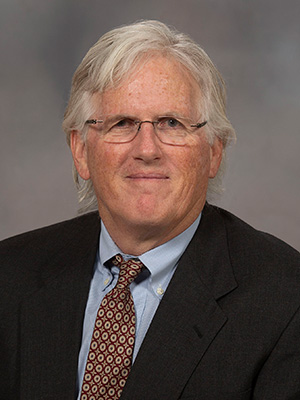
Hester’s research has led to a greater understanding of human physiology. He “has made outstanding contributions to the field of microcirculatory physiology,” said Dr. Joey Granger, dean of the School of Graduate Studies in the Health Sciences, professor of physiology, and director of the Cardiovascular-Renal Research Center.
A Starkville native, Hester earned degrees in biological engineering and mechanical engineering at Mississippi State University before graduating with his PhD in biomedical engineering from UMMC in 1982.
He was named a Billy S. Guyton Distinguished Professor previously, for 2015 through 2020.
Hester has served a member of the faculty for the schools of medicine, dentistry and graduate studies. Among the professional organizations he has served are the Mississippi Heart Association and the American Heart Association.
For years, he has been leading the Center for Computational Medicine in the development of integrative physiological models, including HumMod, which is being used for education, research and clinical trials.
The Center for Computational Medicine has modified HumMod so that it can generate populations of patients. It has been used as an enrichment tool for clinical trials in collaborations with the FDA, the medical device company Medtronic, and the engineering simulation software development company ANSYS.
Granger, also a Billy S. Guyton Distinguished Professor, said Hester is continuing the computational simulation of human physiology started at UMMC by Dr. Arthur Guyton and Dr. Thomas Coleman in the 1970s.
“Dr. Arthur Guyton was my graduate advisor and hired me back at the Medical Center as a faculty member,” Hester said. “He was instrumental in all aspects of my career.”
Hester also acknowledged Dr. John Hall, Arthur C. Guyton Professor and Chair, Department of Physiology and Biophysics. “He has been an outstanding leader,” Hester said. “So much of what I’ve been able to do in my career has depended on the support and help he has given me as chair of the department.”
Dr. Alan Jones, professor of emergency medicine, and associate vice chancellor for clinical affairs
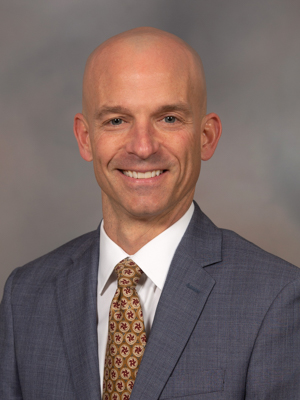
Noted researcher, veteran emergency medicine physician, pandemic response leader, valued educator and health-care hero: all describe Jones.
Appointed associate vice chancellor for clinical affairs in March 2021 after serving since 2013 as chair of the Department of Emergency Medicine, Jones works with administrative, physician and clinical leaders to oversee health care delivery.
A magna cum laude graduate of Millsaps College, where he received his bachelor’s degree in molecular biology in 1994, he earned his MD, summa cum laude, at UMMC in 1999.
He was chief resident in emergency medicine, and had a clinical trials research fellowship, at Carolinas Medical Center in Charlotte, North Carolina.
Jones joined the Carolinas faculty in 2003 and advanced to become an associate professor of emergency medicine and research director before joining the Medical Center faculty in 2011 as professor of emergency medicine and vice chair and research director of the department.
He also serves as the Medical Center’s clinical response leader for the COVID-19 pandemic.
Jones is a recipient of a 2020 SEC Faculty Achievement Award, for the University of Mississippi, from Southeastern Conference-member universities, and the 2020 American College of Emergency Physicians’ Award for Outstanding Contribution to Research.
In addition to providing patient care, Jones has been called on to serve as chief operations physician, vice chair of the Council of Clinical Chairs, interim chief telehealth officer, chair of the Compliance Committee and director of the Clinical Trials Track.
Dr. Richard Summers, the Billy S. Guyton Professor of Emergency Medicine and associate vice chancellor for research, said he identified Jones when he was a medical student “as a potential star here.”
Over the years, Summers tried to recruit Jones to remain or return to UMMC; the third time he was successful. One his way to becoming the next chair of emergency medicine, after Summers, Jones helped build the clinical research program for the department.
“It is a true honor to be recognized by the institution and my peers for work that I truly enjoy,” Jones said.
“I hope that, in some small way, I have been able to give back to my patients and the scientific community just a small fraction of what they have given to me.”
Dr. Richard Roman, Billy S. Guyton Distinguished Professor (2015-2020), and professor of pharmacology and toxicology
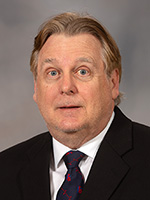
Highly regarded as a focused scientist and an articulate speaker, Roman has been credited with changing how clinicians and research scientists understand the mechanisms responsible for control of blood pressure and blood flow.
A previous Billy S. Guyton Distinguished Professor, he is an internationally-recognized renal and neurophysiologist.
“Most recently, he has been studying mechanisms responsible for autoregulation of blood flow in the brain using state-of-the-art microscopic techniques,” said his colleague, Dr. Jane F. Reckelhoff, chair of cell and molecular biology and a fellow Guyton Distinguished Professor.
“Dr. Roman’s stature within the biomedical research community is also highlighted by his longstanding NIH funding and the numerous awards and honors he has received.”
These awards include the Established Investigator Award, the Lewis K. Dahl Award and the Excellence in Research Award – all from the American Heart Association’s Council on Hypertension – and the Ernest H. Starling Award and the Gabor Kaley Award for Research from the American Physiological Society.
A native of Teaneck, New Jersey, Roman received his BS in chemical engineering from Rutgers University in 1973. He earned his PhD in pharmacology at the University of Tennessee Centers for Health Sciences in 1977 and had a postdoctoral fellowship in physiology at Harvard Medical School.
Roman joined the Medical College of Wisconsin faculty in 1981 as an assistant professor of physiology and became, in succession, an associate professor of physiology, tenured professor of physiology and tenured professor of physiology, medicine and pediatrics, as well as director of the Kidney Disease Center.
He joined the Medical Center faculty in 2009 as professor and chair of the Department of Pharmacology and Toxicology and, one year later, became a professor of medicine (nephrology) and associate director of the T32 Cardiorenal Disease Training Program.
The holder of 15 patents, Roman is a fellow of the Council for the Kidney in Cardiovascular Diseases and the Council on High Blood Pressure Research and is a member of several professional societies, including the American Society of Nephrology, the American Society of Physiology and the American Society of Hypertension.
He is associate editor of the Journal of Cardiovascular Pharmacology and Physiological Genomics and serves on the editorial board of Hypertension. He is a regular reviewer for more than 16 journals.
Roman, the author or coauthor of more than 400 articles in peer-reviewed publications and 400 abstracts, has given more than 125 invited talks at national and international scientific meetings.


